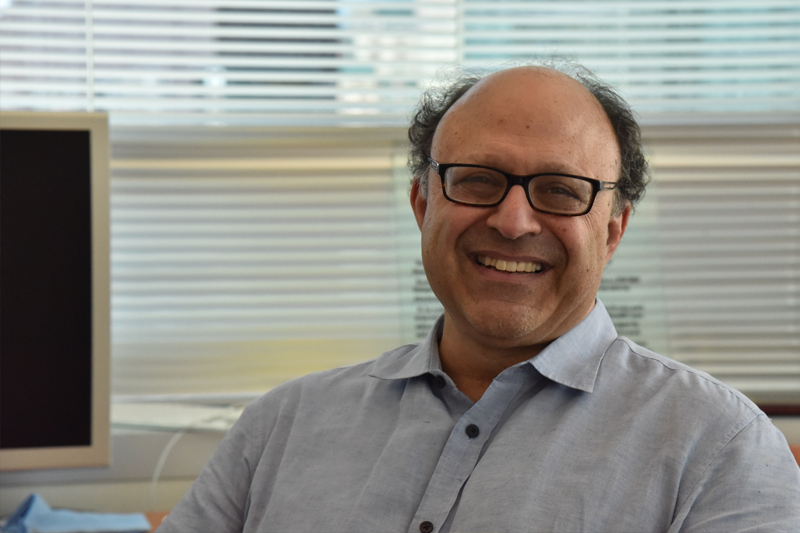Faculty Focus: Howard Fox
- contact: University Communications
- phone: 402.554.2704
- email: unonews@unomaha.edu
- search keywords:
- faculty focus
- kvno
- interview

"Friday Faculty Focus with Brandon McDermott” airs each Friday at 7 a.m. and noon on all-classical 90.7 KVNO, a broadcast service of the University of Nebraska at Omaha (UNO).
On Friday, March 3, KVNO aired McDermott's interview with Howard Fox, senior associate dean of the University of Nebraska Medical Center (UNMC)Research and Development. During their conversation, Fox discussed a recent National Institutes of Health grant and his research on HIV.
Listen to their conversation or read the transcript below:
Brandon: Dr. Howard Fox, thanks for coming on the show.
Dr. Howard Fox: My pleasure, thanks for joining me here (UNMC) and I'm looking forward to our chat.
Brandon: Last year UNMC was awarded a $20 million dollars grant from the National Institutes of Health. Can you talk about this grant, its focus and its potential impact?
Dr. Fox: This was a wonderful accomplishment by a number of people here at UNMC. The grant is led by a good colleague of mine, Dr. Matthew Rizzo, who's head of our neurology department here. A number of us are working with him to make this grant lead to many accomplishments. What it is, it’s to further develop clinical and translational research not only here at UNMC, but in the Great Plains region. You just can't accomplish many things yourself, even if you think you can, it's much better done mixing people with a variety of expertise, getting a diversity of opinions and diversity in the team work. I mean diversity really in every sense, not only in people's backgrounds, upbringings, education, as well as areas of expertise.
Brandon: In a recent study you worked on, there were findings that folks with HIV were getting age-related illnesses earlier in life than those not afflicted with the virus. Can you talk about your findings and what they mean?
Dr. Fox: So this is the wonderful thing, people aren't dying. They aren't getting those terrible infections that we never saw before and all of the sudden they were in these immunosuppressed people. However, they are developing other diseases and again at an increased rate, but at a rate say if they were age 40 - we'd more expect to see that disease in somebody that’s 50 and 50 in somebody that’s 60. These are the non-age related diseases. Age related diseases are things like pneumonia people would get or Kaposi's sarcoma or AIDS dementia. But, instead they are diseases like osteoporosis, cardiovascular disease – what we would call the “normal diseases of aging.” We hope people don't get them, but we expect them in certain populations in certain percentages. But we're seeing them earlier in those with HIV. One thing we want to do is raise clinician’s suspicions of these. So if you are treating somebody with HIV and they're doing great, we can’t find virus anywhere and they're doing well, one should still be thinking “Okay, what are their cardiovascular risks?” or “Do I need a bone density scan?” - Because they're breaking bones due to loss of bone material, where normally one wouldn't think of that in somebody of that age for 10 or 15 years. What we find is that people with HIV, even though there are medications, their age was advanced and it was advanced by five years on average. So this fits with what we're seeing clinically that people seem to be older by the diseases they're getting. Then, what is the link? Is it the HIV virus itself? Is it the treatment we're giving them? And is it reversible?
Brandon: You brought up a couple good points with how we treat HIV, the changes that it's had and you also brought up being in medical school in San Francisco all those years ago. How has our understanding changed, since your time in San Francisco?
Dr. Fox: Quite a bit. When it first came out that there was this immunodeficiency syndrome people didn't even know the cause. But it raised so many medical, as well as, social issues. “How does the virus spread?” People say “Oh, if a mosquito bites somebody with HIV and it bites me, will I get infected?” To, “should HIV infected kids be allowed in the classroom, are they going to transmit the virus?” A whole host of social questions, which of course then – and I'm not a social scientist - but was highly related to the roles of gay people in our society. So, it certainly led to the mobilization of gay people - it’s not just a rare issue out there. They are a vital part of our society and they deserve and need health care and attention paid to their issues. Whether they be health issues like HIV, or other issues such as social equality and things like that.
Brandon: Dr. Howard Fox, thanks for coming on the show
Dr Fox: My pleasure, this was fun.
On Friday, March 10, listen for a conversation with Janelle Beadle, professor of gerontology at UNO.
Want to be a future guest or know someone who should be? Send an email to bmcdermott@unomaha.edu.